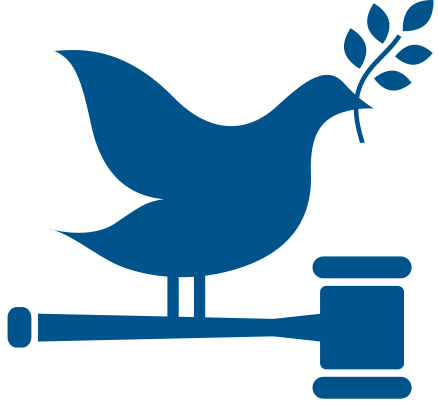
On February 6 and 7, 2019, the co-chairs of the Task Force on Justice led meetings in the Hague to which ministers and heads of international organizations were invited to discuss the opportunities and challenges of achieving justice for all by 2030 and explore strategies to make the most of the upcoming UN High Level Political Forum (HLPF) and the SDG Summit in 2019.
In conclusion of the meetings, the participants adopted the Declaration on Equal Access to Justice for All by 2030. Outlining a framework for moving from justice for the few to justice for all, the Declaration emphasizes the need to:
- Put people and their legal needs at the center of justice systems. Understand what people need and want when they seek justice, which obstacles they face and what kind of justice they receive.
- Solve justice problems. Transform justice institutions and services through a broader range of justice providers, to ensure respect for human rights, to respond to unmet legal needs of billions of people, using high-tech as well as low-tech innovative solutions, based on data, evidence and learning, while taking into account the specificities of the context.
- Improve the quality of justice journeys. Empower people to understand, use and shape the law, while offering them fair informal and formal justice processes that meet their needs in terms of both procedures and outcomes.
- Use justice for prevention. Make use of mediation and other methods to prevent disputes from escalating. Address legacies of human rights violations. Invest in justice systems that are trustworthy and legitimate.
- Provide people with means to access services and opportunities. Break down legal, administrative and practical barriers that people face to obtain documents, access public services, and participate fully in society and the economy, while promoting gender equality.
The Declaration was adopted at a roundtable attended by:
- the Ministers of Justice or their deputies or the Attorney Generals of the following countries: Afghanistan, Argentina, Canada, Ethiopia, Gambia, Guinea, Indonesia, Libya, the Netherlands, Niger, Palestinian Territories, Rwanda, Sierra Leone, Timor-Leste, Tunisia, Uganda, and Ukraine
- the Ministers of International Cooperation or their deputies from Finland, Luxembourg, the Netherlands, Switzerland and the United Kingdom, and;
- high level representatives from: The Elders, the OECD secretariat, UN DPKO, and IDLO.
The Declaration represents a key step forward in creating a shared commitment to put people at the heart of justice programming through legal empowerment while respecting independence.
About the Task Force on Justice: An initiative of the Pathfinders for Peaceful, Just and Inclusive Societies: The Task Force on Justice is chaired by ministers from Argentina, the Netherlands, and Sierra Leone and by the Elders. It brings together a distinguished group of justice leaders and experts. Vivek Maru, Namati’s CEO, is a member of the Task Force.
